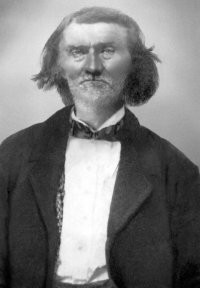 This
is a very interesting article about my husband's gt gt gt grandfather TURNER
CASEY. He was a farmer and a Rev. He is on the 1850 Mulberry
Census with his wife and family, on the Madison County web site.
This
is a very interesting article about my husband's gt gt gt grandfather TURNER
CASEY. He was a farmer and a Rev. He is on the 1850 Mulberry
Census with his wife and family, on the Madison County web site.
Susan
 This
is a very interesting article about my husband's gt gt gt grandfather TURNER
CASEY. He was a farmer and a Rev. He is on the 1850 Mulberry
Census with his wife and family, on the Madison County web site.
This
is a very interesting article about my husband's gt gt gt grandfather TURNER
CASEY. He was a farmer and a Rev. He is on the 1850 Mulberry
Census with his wife and family, on the Madison County web site.
Susan
MARRIAGE: Marriage date 29 Jul 1822 Vital Records Index - North America; FHL #589486, Rhea, Tennessee 1886-1895.
CENSUS: U. S. Census Johnson Co., Arkansas 1840, 1850, 1870, by Wendy Elliott and Virgie Wulff.
LAND: Land Records for Johnson Co., Arkansas 1853-1872.
NOTES: I.G.I. Research by Virgie Wulff, Wendy Elliott and Erma Vanderstaay. Personal knowledge and letters of Vicy Acord Hefner. Was the son of Abner Casey. Photo of Turner Casey in possession of Velda Schamp Nichols.
BIOGRAPHY: When he was about 30 years of age, he was one of the party chosen to select the route over which the Cherokee Indians were moved from GA & Tennessee to Indian Territory. On the return trip, he and a few others traveled through the Ozark Mountains, following Big Mulberry creek and crossed the Divide, then down White River for a ways. They liked what they saw. The land was fertile, game was plentiful, transportation facilities not too far away. And malaria, the dreaded disease of the lowlands, was not too prevalent in the mountains. He had farmed in Tennessee, while he studied for the ministry, for several years. The better land in Roane County was all held by large plantation owners and game had become scarce. By the time Turner returned to his home from the trip through Arkansas, he was anxious to move to the new area that offered some opportunity and where he could put down roots and raise his family.
In 1835, he
and several of his kin and many of their neighbors made up a wagon train
at Paris, Henry Co., that was to go to Arkansas Territory, seeking a better
life. They rounded up their cattle, loaded their household goods and families
into covered wagons and started west, a journey of more than 600 miles
which took them over ten months to make. Practically all of the families
joining the train were those whose ancestors had lived as neighbors in
Virginia more than 100 years before this, and whose descendents are still
living as neighbors all the way
from Arkansas
to California. Upon their arrival in their new home, the settlers started
building their log cabins and clearing the land. Soon Turner & his
father Abner Casey II, who was a millwright, started building a watermill
on Mulberry Creek where it flowed across Turner's land, a mill where settlers
could grind their wheat and corn into flour and meal for their basic foods.
Here, Turner F. Casey, minister of the Baptist Faith, a miller, lived the
remainder of his life. His farm in
sections 20
& 21, Township 12 N - range 24 West, was just east of the present town
of Oark.
There are those
living in Johnson Co. in 1970 who remember hearing their grandfathers tell
of the camp meetings held by Turner Casey in those early days.
They also
recall that he was the preacher who married their grandparents & great-grandparents.
He was recognized as an upright citizen and an outstanding Baptist minister.
He was opposed to secession, as were many living in the community, but
was too old to take up arms in the Civil War. Both Turner and his wife
Sarah Ann, were buried in Oark Cemetery.
Copy of an
original marriage license written in the handwriting of Turner Casey as
follows: "I Turner Casey, a Baptist Minister of the gospel of Christ do
hereby certify that I did solemnise the rights of matrimony in the County
of Johnson and State of Arkansas on the 16th day of November A.D. 1868
between Columbus Stuart aged 26 years and Frances Acord aged 19 years both
of the County and State aforesaid. Filed this 23rd day of Dec 1868".
Copyright © 2000
by Peggy J. Rogers and the submitters. All rights reserved.
This site may be freely
linked to but not copied in any fashion without written consent.